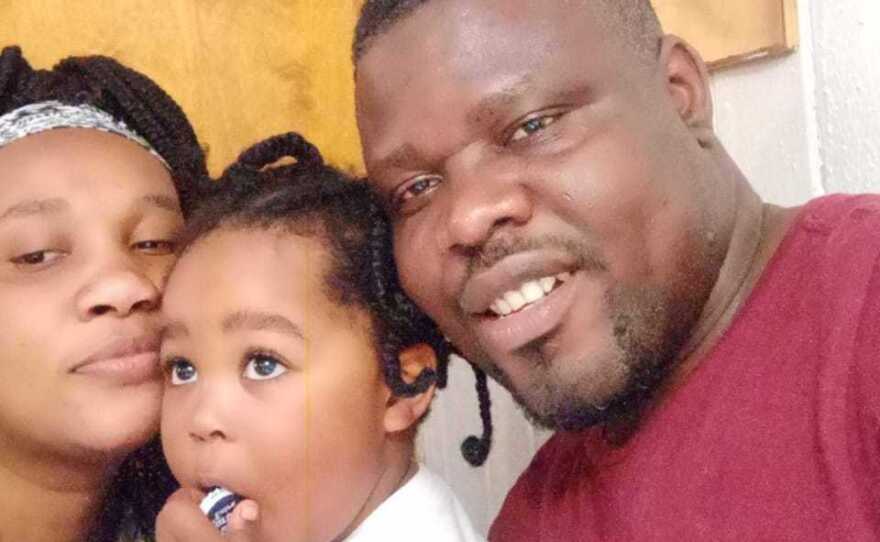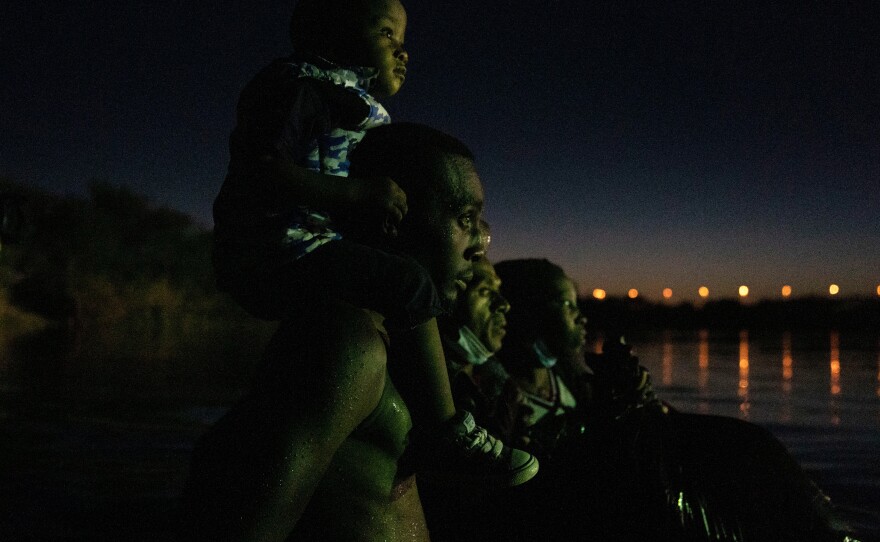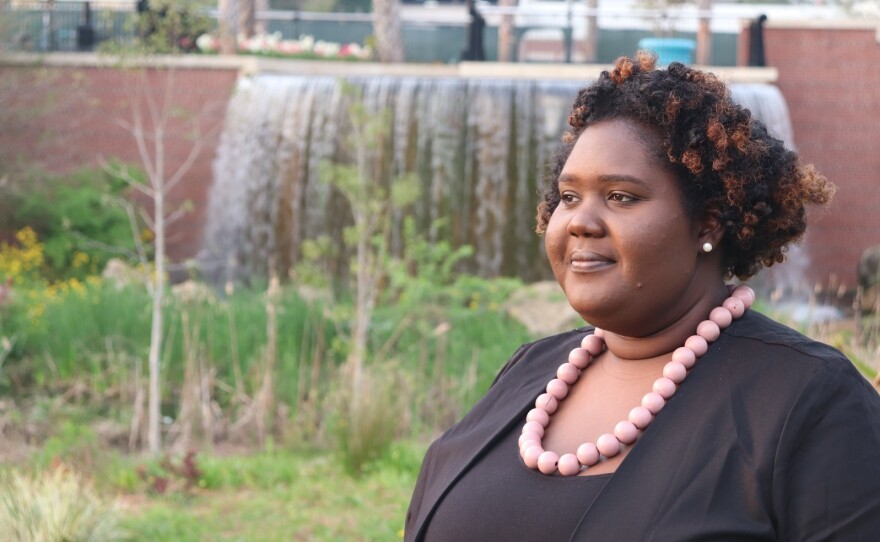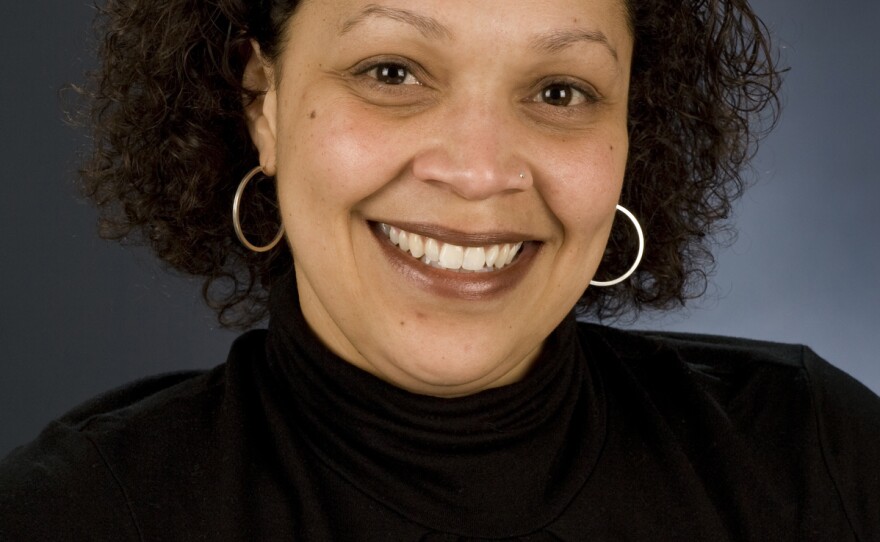Like thousands of Haitians, Gibbens Revolus, his wife, Lugrid, and their 2-year-old son, Diego, made the treacherous journey to the U.S.-México border from Chile and ended up under the international bridge in Del Río, Texas, last month.
Photos from the makeshift camp in Del Río show desperation and unsanitary conditions where almost 15,000 Haitians hoped to apply for asylum. U.S. Border Patrol officers on horseback were seen corralling people, pushing them back to the Río Grande and onto México.
"I want people to understand the misery," says Revolus who describes the journey as "hell." Revolus can't remember the exact date when his family started the journey to the the U.S. border. "Time blurs," he says. But it took them almost three months of travel mostly by bus, many days by foot and the family crossed from Colombia to Panama in a jam-packed boat. Revolus says his infant son kept getting sick, constantly throwing up and having diarrhea.
Border Patrol officers detained the family in Del Río on Sept. 24 when the makeshift camp was cleared by authorities. They were taken to a detention center in Texas.
"We were not given the chance to make our case for asylum," Revolus says. The family was put on a deportation flight to Haiti on Sept. 27.
"We were just looking for a better life, but we were turned back," he says.
For many Haitians, like Revolus, the experiences lived at Del Río encampment last month served as a painful reminder of their past, they say.
It's a history of racism and mistreatment by U.S. authorities that dates back to when Haiti gained its independence in the 19th century to today's instability.
"After all the decades of U.S. meddling in Haiti's affairs, I truly believed I'd be allowed to apply for asylum at the border," Revolus says, speaking on the phone from Port-au-Prince. "We never thought we would end up back in Haiti."

Revolus and his family are back in a country where the rule of law seems to have collapsed.
"Haiti is like a war zone right now," he says. "Shootings are rampant, people are being killed for small things. It's not a livable country. It's very dangerous."
Haiti is in the aftermath of a recent devastating earthquake, as well as political instability after President Jovenel Moïse's assassination in July. The country is experiencing growing gang violence and out-of-control kidnappings, according to Control Risks, a firm that specializes in risk consultancy.
"We don't leave our house very much, especially after dark," says 42-year old Revolus, whose family is temporarily living with one of his sisters in Port-au-Prince, the capital.
Revolus and his wife fled Haiti on Jan. 6, 2018.
"We were first welcomed in Chile," he says. He was able to find work at a meat shop, stocking refrigerators and shelves but was barely making enough to cover basic living expenses. Then attitudes toward Haitians changed, he says. "We faced discrimination and racial slurs."
"Two co-workers tried to stab me," says Revolus, who was in Chile on a work visa. They resented having to share tips with him, he says. "When I complained to my boss, he didn't do anything."
Feeling growing pressure in Chile, many Haitians started traveling to the U.S. border earlier this year. "Many friends made the journey and were able to reunite with family in the U.S.," Revolus says.
He says he and his wife garnered the courage to head to the border. "It wasn't an easy decision, but we were desperate," he says.
For months Revolus says he spoke with his cousin Francesca Menes, an activist in Miami who runs The Black Collective, a grassroots organization, about his plans to seek asylum at the U.S. border, and she warned him against it.
"I wish I had listened to my cousin," Revolus says, "but we were just looking for a better life."
Menes says that when Revolus shared his plans, her heart sank – not only because the journey is long and dangerous, she says, but, "as Black immigrants, you are treated much more differently and much harsher than any other immigrant group. It's the layer of being Black and immigrant," she adds, "being Black in America is a very different reality."

The relationship between Haiti and the U.S. is not mutually beneficial
Many Haitians see U.S. immigration policy as historically racist and anti-Black – pointing to the U.S. occupation of Haiti from 1915 to 1934, including the support of a brutal dictatorship and the recent massive surge of migration in Del Río, Texas.
"It's not a mutually beneficial relationship how Haiti governs and functions, is to the benefit of the United States," Menes says.
She says that leadership in Haiti "has either been supported by the U.S. or if it's supported by the people [of Haiti], it's interrupted by the United States government."
"We have seen, historically, a lot of puppet presidents that the United States has put in power," says Menes, who is Haitian American. "It happened with Aristide and he was actually doing good for the people."
Menes is referring to Jean-Bertrand Aristide, a former priest who embraced liberation theology, an approach that emphasizes helping the poor and oppressed. Aristide was overwhelmingly elected president of Haiti twice – first in 1990 and again in 2000, both times his administration was overthrown in a coup d'état supported by the United States government.
Haiti is the country with the highest rate of asylum denial in the United States, according to data from the Justice Department. As reported by the Associated Press, from October 2018 through June 2021, of 4,202 applications, only 194 were granted during this period.
From Sept. 19 to Oct. 3, DHS has sent 65 repatriation flights back to Haiti with a total of 7,016 Haitian nationals, according to a DHS official who says that as the number of Haitians has decreased, either because they decided to go back to México or because they are detained, the number of flights has also decreased.
The island nation has been battered by natural disasters, including earthquakes and hurricanes. A catastrophic quake in 2010 killed more than 220,000 Haitians, left several thousand injured and about 1.5 million homeless – that was the catalyst for the massive exodus of Haitians to Latin America.
But it's not only political instability and natural disasters that have hindered Haiti's economic growth, the country has also battled health pandemics like cholera about a decade ago and now the coronavirus – making Haiti the most "unequal country" in the Western Hemisphere, according to the World Bank.

How Haiti became the poorest country in the Western Hemisphere
After the 2010 quake, Haiti was referred to as "the poorest country in the Western Hemisphere over and over," says Leslie Alexander. She is a professor of history at Arizona State University, past president of the Association for the Study of the Worldwide African Diaspora (ASWAD) and Executive Board Member at the National Council for Black Studies (NCBS.)
"But no one really wanted to have a deeper conversation about how and why Haiti became the poorest country in the Western Hemisphere," Alexander says.
"What's happening contemporarily in terms of U.S. Haitian relations and the crisis that's happening with Haitian asylum seekers at the border have a very long history," she says, and dates to when Haiti became the first Black nation in the Western Hemisphere that revolted to gain its independence from the French in 1804.
"Haiti in the 19th century was really viewed as a danger, as a threat to the safety and security of the United States," Alexander says. "Haiti represented a contagion and the disease of rebellion that caused Haiti to become an independent Black nation," and the United States worried it would spread to other parts of the Americas, Alexander says.
But it wasn't the revolt alone that set Haiti free. France forced Haiti to pay 150-million gold Francs in annual installments to the French government. Haiti agreed, but it created an impossible cycle of debt, Alexander says.
"Haiti then essentially has to exchange one master for another," Alexander says, from France to the U.S.
Upon the 1915 U.S. invasion of Haiti, Alexander says, "The United States decides to extend Haiti a debt consolidation loan," so that it can pay back the money to France, essentially gaining control of Haiti's government and institutions.
American merchants and the U.S economy benefited tremendously from their trade relationship with Haiti, says Alexander, even after Haiti becomes an independent nation. "Throughout most of the 19th century, Haiti fluctuated between being the United States' fourth and fifth most important trade partner." She says that the U.S. was purchasing raw materials, like cotton and coffee and even wood from Haiti and also selling manufactured goods back to Haiti.
"Haiti has really been for decades exploited [by U.S. interests]," she says.
Haitians have been accused of not being able to manage their own natural resources, says Alexander, "but the truth is that the sort of raping and pillaging of Haiti as a nation has really happened by foreign countries, primarily the United States."

"Officers abuse migrants regularly and even lie to the public about it"
"We can't talk about the treatment of Haitians, the mistreatment of Black migrants without acknowledging that there is anti-Black racism at a systemic level in our country," says Wade McMullen, a Robert F. Kennedy human rights lawyer and asylum expert.
Last month, McMullen spent two weeks in Del Río trying to counsel and document asylum-seeking Haitians.
"It's a black box and there is a lack of ability to monitor" says McMullen about the U.S. Customs and Border Protection agency. "Officers abuse migrants regularly and even lie to the public about it."
The Del Río camp was on U.S. soil, but that did not stop CBP officers from threatening Americans, McMullen says. "CBP was threatening U.S. citizens, journalists, human rights advocates and others to charge them with illegal entry, if we tried to access the camp," he says. "It was even a heightened degree of lack of transparency."
On Sept. 24, Homeland Security Secretary Alejandro Mayorkas announced at a White House press briefing that the Del Río camp was closing. He told reporters that between Sept. 9 and Sept.24, some 30,000 migrants had crossed to Del Río, although Mayorkas also put that number at 15,000 — adding to the confusion.
"I will tell you that it is unprecedented for us to see that number of people arrive in one discrete point along the border in such a compacted period of time," Mayorkas told reporters.
It may be unprecedented, McMullen says, but it shouldn't have surprised anyone in Biden's administration. "Anybody who knows anything about history knows that we've caused enormous instability in Haiti," he says.
"Whether or not we knew that upwards of 15,000 people would show up at one place in one time, it was only a matter of time," he says.
U.S. policies are blocking people from applying for asylum
McMullen says that there are thousands of people waiting to present themselves at the border to apply for asylum in the United States and the government's policies are blocking them from doing so.
The Trump administration took away temporary protected status or TPS for Haitians in 2017. TPS provides legal immigration status to people from countries affected by civil unrest or natural disasters. Then, when the Coronavirus pandemic hit in early 2020, Trump enacted Title 42, which is not an immigration policy, but a public health emergency policy created "to circumvent immigration laws and policies and the rights of asylum seekers."
McMullen says that the Biden administration has not fulfilled its promise to rescind Title 42, "And in fact, [in Del Río] we saw using it to try to justify the mass expulsions to Haiti."
At the White House briefing, when Secretary Mayorkas was asked by reporters about the lack of leniency towards Haitian asylum seekers, considering the growing gang violence and instability, he told reporters that the U.S. determined Haiti to be safe.
Though the State Department's travel advisory for Haiti warns against "travel to Haiti due to kidnapping, crime, unrest, and COVID-19."
Patrice Lawrence is the executive director of the UndocuBlack Network. Her group advocates on behalf of former and current undocumented Black people in the United States.
"It's racism," says Lawrence, referring to U.S. immigration policies and treatment of Black migrants by border officers. "It's skin color, it's socioeconomic status, it's language."
Lawrence says that before Title 42, the U.S. used the restrictive metering system to limit the number of asylum seekers at the border. "Asylum cases have been backlogged deliberately for years," she says.
Lawrence, along with the Haitian Bridge Alliance, United We Dream and the Movement for Black Lives co-wrote a letter of complaint to the Biden administration last month, saying, "Immigration is a human rights and for Black immigrants, it is a form of reparations for centuries of colonialism and extraction."
They also asked that CBP end its treatment of Black migrants. "Haitian migrants are facing open violence from CBP," at the border, the letter says. It was signed by 236 organizations.
Watching news of the border encampment in Del Río, Texas, last month was painful for 22-year-old Garmma. It was also personal - her eldest sister, Natacha, 39, was detained in Del Río when the Department of Homeland Security swept in to clear the migrant camp on Sept. 24.
"I don't really know my sister's circumstances at the camp," Garmma says. She says she felt despair "watching what was happening at Del Río." Her voice trails to a whisper. "Haitians under the bridge in squalor and disease, with little food and lying on the ground – no one deserves that."
Garmma doesn't want NPR to use her last name because she's worried that by speaking publicly she could hurt her sister's chance for obtaining asylum.
"I'll come to the U.S., even if it costs me my life..."
Like thousands of Haitians, Natacha was driven out of Haiti by the country's violence and insecurity, deep poverty and the inability to find work – she immigrated to Brazil about three years ago, but her asthma worsened and she felt lonely, Garmma says. The sister's immediate family, mom and two younger brothers, live in the Washington, D.C., area, and Natacha dreamed of re-uniting with them, Garmma says.
"No matter what, I'll come to the U.S., even if it costs me my life," Garmma remembers Natacha saying on the phone about three months ago before Natacha began her journey to the U.S. border by bus.
Garmma says she pleaded with her sister not to come. She advised her to look into getting a visa to come to the U.S. Garmma says she worried about Natacha making the dangerous journey alone and now. "I'm desperate, I need help and I don't know what's going to happen to her," she says, adding that the family doesn't have money to hire a lawyer.
She last spoke with Natasha almost three weeks ago when her sister arrived at a detention center in Louisiana, but that's about all Garmma knows.
Garmma says she feels somewhat guilty. "My sister made the journey to the border because I'm here, because our family is in the U.S.," she says, "but we can't help her."
Garmma and others say they feel somewhat conflicted about the U.S.
"We face discrimination here because we are Black," says Garmma, though she notes that Haitians are discriminated against everywhere, "even in our own country by the upper class." She says that at least the United States offers Haitians opportunity. "We can find jobs and safety here, a better life," she says.
Garmma isn't losing hope about Natasha, she says. "I know I'll hear back from my sister, I know she'll have a chance to apply for asylum."
As for Gibbens Revolus back in Haiti, he says he's still sad at how things turned out in his attempt to seek asylum in the United States, but he has to move on. "I can't let despair and depression sink in because I have to be strong for my wife and my son."
He says he plans to migrate to Brazil soon and start a new life there.
Copyright 2021 NPR. To see more, visit https://www.npr.org. 9(MDAzMjM2NDYzMDEyMzc1Njk5NjAxNzY3OQ001))







